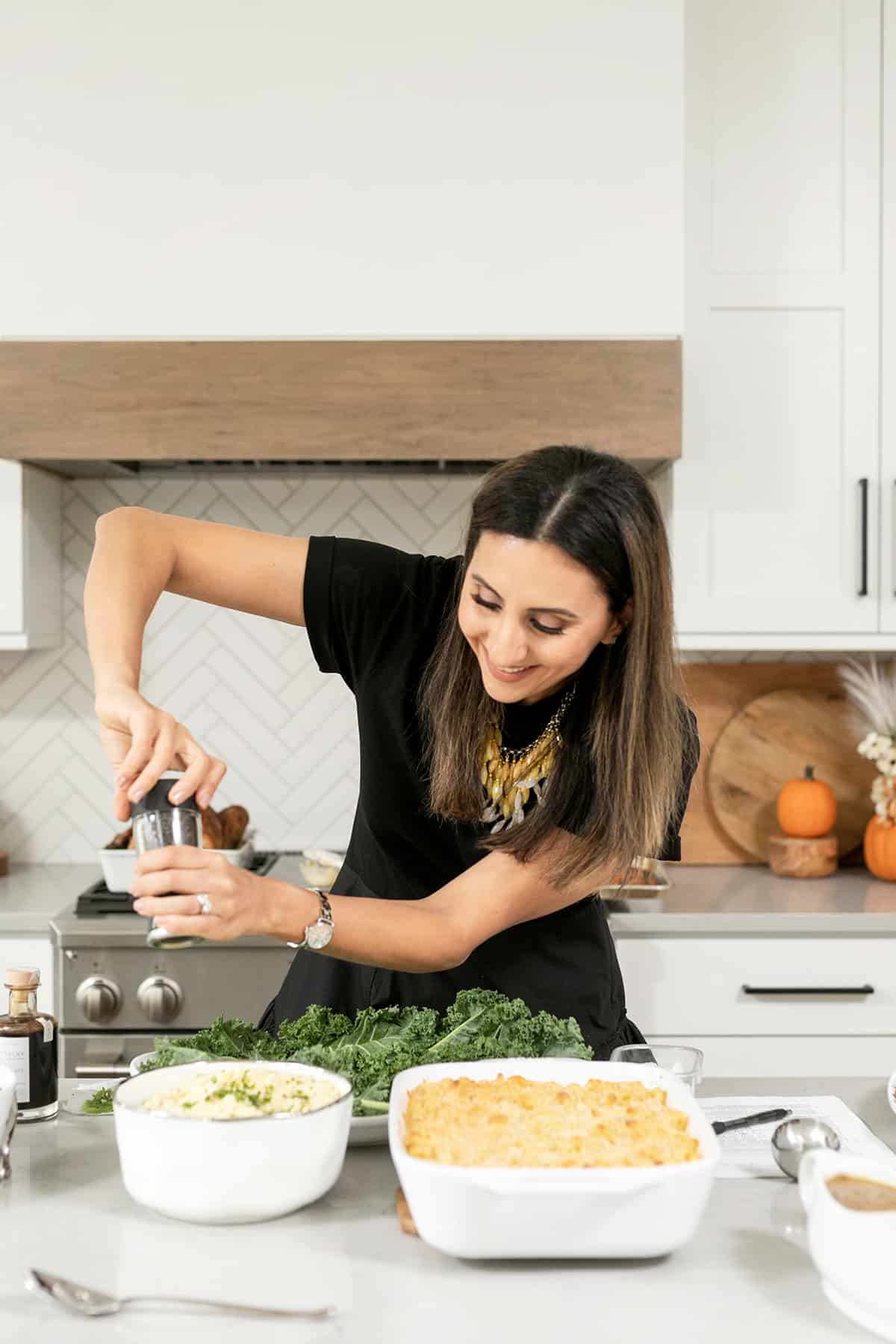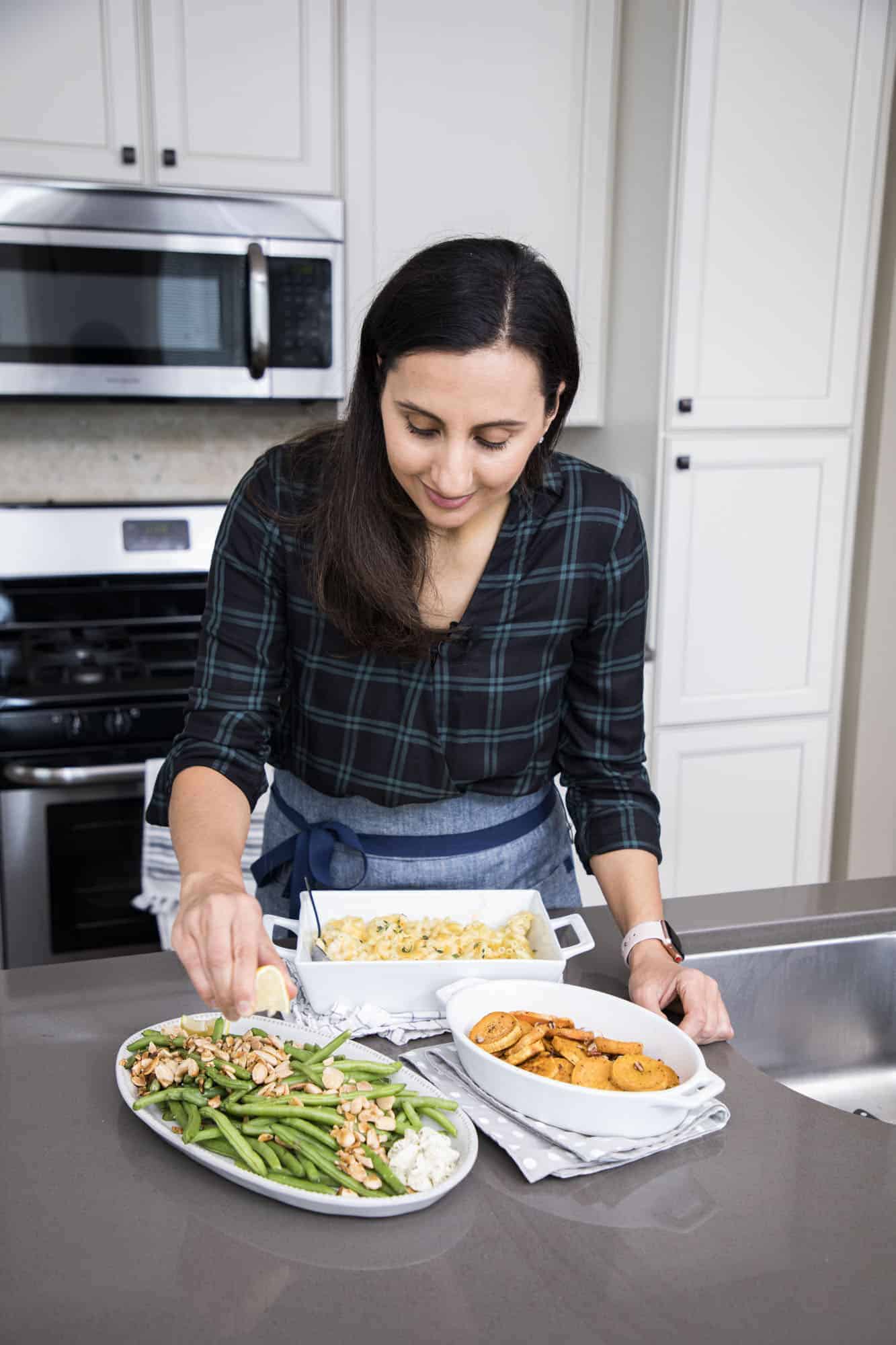This post may contain affiliate links. Please read our disclosure policy.
What cooking tips do I give new cooks? I was recently interviewed and asked this question and it got me to thinking about all the things I didn’t know when I was started to cook. Before I even begin, please, new cooks, be kind to yourself. The more you cook the more confident you become, and the results will be delicious.

Cooking at home can be intimidating if you are new to it, but with my best top tips, you will have confidence in the kitchen to become a great home cook. The more you know, the more you will enjoy your time in the kitchen!
1. Invest in the right gear
Measuring tools and reliable cookware equal success: Here is a great tip – where you’re a new or old cook -you do not need the fanciest stuff. Target, or even a restaurant supply store has the basics: a chef’s knife, a big stockpot for pasta, a saucepan, a skillet, a baking sheet, measuring cups and spoons, a whisk, a spatula and stirring spoons are enough to start.
2. Do your reading
Read the entire recipe. A rookie mistake is to start cooking only to get to the end of a recipe and realize a dish needs to chill or cook for a long time, hours past when you planned to serve it. Pay attention to how much time the dish takes to prep and cook and rest or chill. Check your pantry and fridge for ingredients.
3. Put everything in its place
Do your mise en place, which is French for setting up. It means getting everything needed for a recipe out on the counter, and preferably having it chopped, diced, and/ or measured and ready to go. You see this setup in my videos and on cooking shows. The set up speeds things along and prevents you from forgetting ingredients.
4. Pay attention to the heat setting
When cooking on the stovetop, don’t ignore the heat level a recipe dictates. Some jobs, like searing steak, require high heat, while others like toasting spices need a gentler flame. An ingredient like onions will taste very different stir-fried on high versus slow cooked to caramelization. Adjust your burner power to the job its doing.
5. Buy some thermometers
If all your baked goods take forever or you are burning everything, your oven may be off. Invest in a $6 oven thermometer and adjust accordingly. (You can also pay for an oven recalibration.) In addition, a meat thermometer – for meat, poultry, fish, even liquid temps – easily answers the question: is it done yet?
6. Learn how to use salt
Learning when, how much, and what kind of salt to use can really make a difference. Salt enhances foods’ natural flavor, but new cooks often over or under salt. I salt food in layers throughout the cooking process. Remember, different types of salt have different levels of salinity. Diamond Kosher Salt, a chefs’ favorite, is roughly half as salty as table salt. Taste and adjust. 🙂
7. Freeze herbs whenever you have extras
Fresh herbs completely transform a dish even if they are frozen. If I have bought some for a specific recipe, I always chop up what’s remaining and freeze them on their own or mixed with olive oil. They work so well in stir fries, stews, and soups. My favorite to do this with is cilantro, since I use it in so many of my Lebanese recipes.
8. Toast grains
Toast grains before cooking them. Like the layering of salt during cooking, toasting amps up the flavor of a relatively neutral grain. I toast rice, quinoa, bulgur and farro, I either dry toast them in a hot pan or saute in olive oil before covering with water and cooking. This brings out the grain’s nuttiness for a richer flavor.
9. make Homemade dressings/sauces
Make your own salad dressings and sauces instead of using store-bought. Two of my go-tos, Fattoush dressing, and garlic sauce, use minimal ingredients and have such great flavor when made fresh. The same is true for many simple vinaigrettes and sauces. Bonus? No unpronounceable preservatives or added sugar!
10. Always garnish
Add a finishing touch to your cooked meals. There is a reason restaurants do this. A squeeze of lemon over freshly grilled fish, a drizzle of vinegar in soup or a shower of freshly chopped herbs can balance and enhance flavors bringing out the best in your cooking.
These simple tips for new cooks will will have you cooking at home like a pro in no time and serving up delicious food! The most important thing is that you enjoy your time in the kitchen – mistakes will happen, but I promise, it won’t be the end of the world!
More Cooking Tips and tricks
- How to organize your fridge
- How to cut an avocado
- How to cut an onion
- How to stock a freezer
- Tips for making meal time delicious
- How to grill
If you find these tips for new cooks useful, I’d love to hear from you! And if you snapped some shots of any of these tips and tricks, please share it with me on Instagram so I can repost on my stories!






